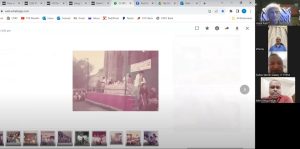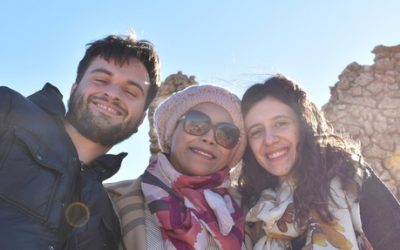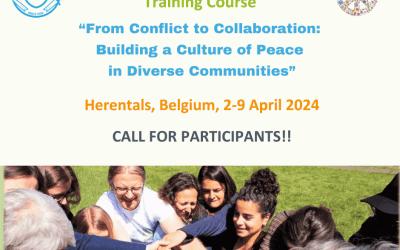White Cane Safety Day event
SCI-India’s Maharashtra State Group commemorates the World White Cane Safety Day.
SCI-India’s Maharashtra State Group organized a webinar to commemorate the World White Cane Safety Day.
The Group has been associated with organizations working on issues faced by the visually impaired for over four decades. The aim of the seminar was to expose new volunteers to the world of the visually impaired, to the challenges they face in daily life and how the little but mighty cane helps them go about in the world they themselves cannot see. The speakers included SCI volunteers as well as individuals from organizations working with the visually impaired. Some 20 volunteers attended the webinar, which was conducted in the local language (Marathi). In his opening address, Suhas Karnik, an active SCI-er since the mid-1980s, explained how the white cane signifies independence for the blind by enabling mobility and minimizing the need to rely on others for help. He also described the ‘do’s and ‘don’t’s in the interaction with the visually impaired, and common mistakes people make. Some of these are often-overlooked things, such as how to introduce yourself, how to give directions, and letting your visually impaired companion know of your presence, and if you are going to be away, even for a short while.
A founding member of the Blind Graduates’ Forum of India (BGFI) and former Honorary Secretary of the National Association for the Blind (NAB), Suhas is currently Vice-President of the Blind Persons’ Association (BPA), and the Group’s National Council delegate. He has taken a stand on various disability-related issues, including the difficulty faced by the visually impaired in differentiating India’s new bank notes, and the lack of adequate transport facilities for the disabled. Shilpa Kadam, who works with the NAB in Mumbai, talked about the origin of the white cane, and how the White Cane Safety Day came into being. In the United States of America, where it started in 1964, it is now observed as Blind Americans Equality Day. Shilpa further expounded on the dos and don’ts in guiding a blind person. The white cane is a life companion for the blind and a symbol of dignity and independence, she said.

Mangesh Gaykar, who works with the NAB and is soon joining the BPA as Advocacy Officer, told the participants about the new smart cane. Conventional canes, whether the long or the folding types, often miss objects that have spaces underneath, such as a standing truck or bus, resulting in the cane holder bumping into the object. The smart cane comes with an attached device which creates vibrations or sound to warn the cane holder of the obstacles ahead. The device can be fitted on a conventional cane, too. The smart cane is much more expensive (around Rs 1000 to 1200), and at present its benefits are still below expectations. But research is ongoing in this area, says Mangesh, so that a more useful and affordable product may be available in the near future. Mangesh and Suhas have formed two online groups for fellow visually impaired. Each group has 700-800 members. The members receive guidance on various government schemes, and assistance in addressing issues faced by working as well as self-employed or unemployed blind persons. The Indian government has passed the Rights of Persons with Disabilities Act, 2016 (the RPD Act). Its implementation is ongoing and new initiatives are planned. The online community is kept abreast of the developments. The online channels help understand the difficulties faced by the members, and find solutions through discussion.
While the cane grants the visually impaired more independence in mobility, their daily lives are not without struggle. To overcome these challenges, the visually impaired develop their own techniques. Still, they may need some assistance from time to time, for example, in reading or writing. A little guidance and opportunities, Mangesh says, will go a long way in enabling the visually disabled live a less stressful life, as normal as the sighted. Mangesh’s speech prompted a number of constructive recommendation from the audience. Nitin suggested organizing a mobility training course for SCI volunteers who work with visually impaired people. A similar course held in the 1980s greatly benefited the SCI volunteers of that time, including him, in improving interaction with blind persons. Shilpa pointed that parents of visually disabled children should also be invited to such courses, since many parents are unaware of the potential of their disabled children in managing their own affairs and living a more independent life.
Chaitanya Arote and Neha Chalke, young volunteers from the Group’s Nashik Unit, gave more details about the history of the white cane and the World White Cane Day.
Chaitanya stressed the need to create awareness about the white cane and remove misconceptions about it among the general public. Though extremely useful, the white cane is not a magic wand, and sometimes the cane holder needs assistance, too; for example, when crossing the road. Neha said, “The users of white cane deserve our appreciation and respect, not just for their personal accomplishment, but the message they convey us, that disability doesn’t define a person and certainly doesn’t limit the potential, … that with dedication and determination, anything is possible.” Nitin invited some of the long-time SCIers to talk about their experiences. That opened up a lot of old memories of working with the visually impaired colleagues and their organizations. Strong bonds of friendship have been formed through this work.
Suresh Iyer shared memories of the legendary Walk to Win, an awareness walk organized by the Blind Graduates’ Forum of India (BGFI) together with SCI, in 1986. The walk, from Pune to Mumbai, covered the 150km distance in 6 days and the walkers received joyous welcome and celebrations at every village on the way. The prior trial runs for reconnaissance and logistical arrangements were equally memorable and fun. Jayaprasad has preserved the photos of those days, which Vivek shared with the audience and described the events. It gave a sense of nostalgia to the old volunteers and of awe to the new. Suhas added that BGFI is still functioning well, and its new, tech-savvy members throughout the country hold online meetings and actively engage in advocacy to help resolve issues affecting the visually impaired.
Other participants also rushed to share their experiences in the Group’s activities. Nitin related an anecdote involving Vijay Merchant—one of India’s legendary cricketers and later a commentator, radio host, and a charitable advocate for the disabled. Once, on overhearing someone talking about a road-crossing accident, the first thing Mr. Merchant asked was if the victim was blind. When he was told the victim was sighted, Mr. Merchant remarked that blind people rarely have road-crossing accidents, because they are careful. Suresh Iyer shared his memories of the Walk to Win rally and how new friendships formed through that event. He and Jayaprasad first met at the rally as volunteers, and are close friends to this day. Sunil Pednekar shared his memories of the short-term workcamp at the Kamla Mehta Dadar Blind School in 1988 (where he’d meet his future wife). SCI, he said, is often called a marriage bureau because many volunteers have found their soul mates through SCI work.
Panjabrao Gawai appreciated the inspiring stories and thanked the old volunteers for sharing them. He then shared his own recent experience at the Dadar Blind School, where he was given a tour of the facility. It was his first time to see the Braille language being written/typed and read, and he was astounded. The school has a museum, where he was able to touch bird feathers, also for the first time. He thanked SCI for this inspiring experience. Neeta Rane praised the commitment and efforts of the senior volunteers and hoped the new volunteers will try and emulate that spirit in their work by learning from the seniors. To Nitin, working in SCI is not social work, but personal development, first and foremost. SCI offers a platform for learning about the world around us, and that education can be a life-long treasure. Working together helps develop strong bonds of friendship, while also helping communities to help themselves. Sunil urged new volunteers to spend more time working together physically on projects, than merely participating in virtual meetings.
The Group’s nearly five decades of association with the Dadar Blind School has provided a great opportunity for attracting new volunteers, who in turn learn about SCI through this weekend activity which involves reading books and playing with the visually disabled children. Jayaprasad shared his memories of the poster exhibition to create awareness about the visually disabled. One of the slogans of this exhibition was ‘Disability is a limitation like any other.’ The exhibition was held at many places, including colleges, public spaces and residential areas. The webinar concluded with Jayaprasad’s vote of thanks to all the speakers and the participants.
Explore more news
Youth eco-volunteering in a Euro-Mediterranean context: challenges and opportunities
We reached the culmination of our Youth Green Deal project, funded by Erasmus+. It was time to bring our community together and share our remarkable journey and insights with a wider audience. The "Youth eco-volunteering in a Euro-Mediterranean context: challenges and opportunities" conference took place from June 14 to 17, 2023, in Tunis, Tunisia. This conference presented a significant...
Call for Participants: Environmental Activism through Civic Engagement for Nature
Join the SCI Climate Team and become part of a passionate group of volunteers dedicated to environmental activism and climate justice. A training course called "PEACE for Nature" is being held to empower young individuals to become effective climate activists and advocates. PEACE for Nature Training Course: What will you learn? Advocate for equitable solutions and understand the principles of...
Call for participants: “From Conflict to Collaboration: Building a Culture of Peace in Diverse Communities”
The “Peace in Diversity” project develops conflict resolution skills in youth leaders, equips professionals and volunteers with tools for peacebuilding in daily lives, enhances partner organisations’ capacity as peace promoters, and takes co-responsibility for the peaceful future of Europe. In particular, we aim to: demonstrate to the young people that peace starts with how we treat our...




